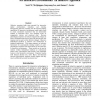Free Online Productivity Tools
i2Speak
i2Symbol
i2OCR
iTex2Img
iWeb2Print
iWeb2Shot
i2Type
iPdf2Split
iPdf2Merge
i2Bopomofo
i2Arabic
i2Style
i2Image
i2PDF
iLatex2Rtf
Sci2ools
131
click to vote
AIIDE
2006
2006
Predicting User Physiological Response for Interactive Environments: An Inductive Approach
Affective reasoning holds great potential for interactive digital entertainment, education, and training. Incorporating affective reasoning into the decision-making capabilities of interactive environments could enable them to create customized experiences that are dynamically tailored to individual users' ever changing levels of engagement, interest, and emotional state. Because physiological responses are directly triggered by changes in affect, biofeedback data such as heart rate and galvanic skin response can be used to infer affective changes. However, biofeedback hardware is intrusive and cumbersome in deployed applications. This paper proposes an inductive framework for automatically learning models of users' physiological response from observations of user behaviors in interactive environments. These models can be used at runtime without biofeedback hardware to continuously predict users' physiological state directly from situational context in the interactive e...
Affective Reasoning | AIIDE 2006 | Artificial Intelligence | Interactive Environment | Physiological Response |
Related Content
| Added | 30 Oct 2010 |
| Updated | 30 Oct 2010 |
| Type | Conference |
| Year | 2006 |
| Where | AIIDE |
| Authors | Scott W. McQuiggan, Sunyoung Lee, James C. Lester |
Comments (0)

